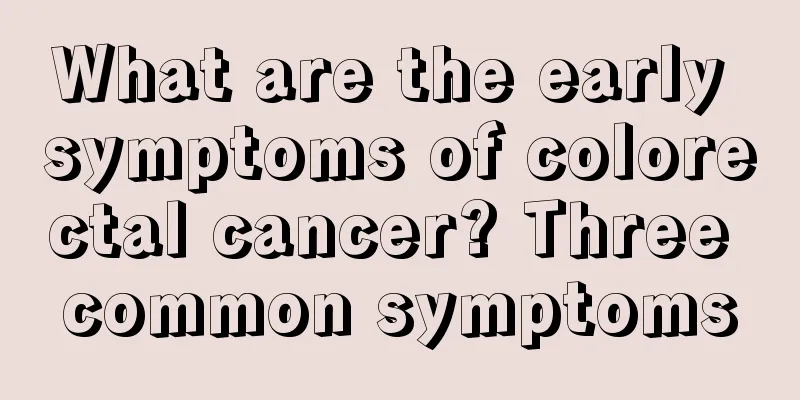What are the early symptoms of colorectal cancer? Three common symptoms

|
Early symptoms of colorectal cancer include changes in bowel habits, blood in the stool, and unexplained abdominal pain. If you find these symptoms, you should seek medical attention immediately. By identifying these symptoms early, you can detect the disease early and avoid delaying treatment. 1) Changes in bowel habits In the early stages of colorectal cancer, there may be changes in bowel movement frequency, such as alternating diarrhea and constipation, or irregular bowel movements. Some patients may feel that their bowel movements are not complete or that they have a feeling of intestinal obstruction. This is because tumor growth may cause the intestinal passage to narrow, thus affecting normal bowel movement. If there is persistent bowel abnormality and it cannot be explained by other reasons, it is recommended to see a doctor as soon as possible and undergo a colonoscopy. 2) Blood in stool or abnormal stool color Blood in the stool or abnormally dark color (such as black stool) is one of the more common early symptoms of colorectal cancer. Blood in the stool may be caused by damage to the intestinal mucosa caused by the tumor, but it should be noted that blood in the stool may also be related to other diseases such as hemorrhoids, and the cause should be further clarified through examination in time. It is recommended that patients first undergo a fecal occult blood test after discovering blood in the stool, and then diagnose through colonoscopy and other means. 3) Unexplained abdominal pain or bloating Tumors may affect the normal peristalsis of the intestines, causing intestinal stenosis or even partial obstruction, which can lead to abdominal pain or bloating. This pain is usually mild and intermittent, but may become more frequent and severe as the condition worsens. If the abdominal pain is not obviously related to eating, lasts for a long time or is accompanied by other symptoms, you should be highly alert to the possibility of colorectal cancer. Early symptoms of colorectal cancer can be easily confused with other digestive tract diseases. Therefore, if you notice changes in bowel habits, blood in the stool, or unexplained abdominal pain, you should seek medical attention and undergo screening as soon as possible. Paying attention to a healthy lifestyle, such as consuming more dietary fiber, exercising regularly, quitting smoking and drinking, can also reduce the risk of colorectal cancer. Early detection, diagnosis, and treatment are the key to controlling the progression of colorectal cancer and improving the cure rate. |
<<: Can prostate cysts be cancer?
>>: Early symptoms of brain glioma in children
Recommend
What are the treatment measures for testicular cancer
Testicular cancer, as the name implies, is also a...
What are the exercise methods to strengthen the spleen and stomach
Exercise can help us achieve the goal of strength...
What impact does rectal cancer have on pregnancy
The risk is slightly higher for those with a fami...
How long does it take for Oryzanol to take effect?
People who often suffer from insomnia must be ver...
What should I pay attention to in my diet during chemotherapy for colon cancer?
The best time to treat cancer is the early stage ...
What is the cause of toothache
What we call "tooth bone" is actually t...
What are the specific manifestations of the harm of teratoma
Teratoma is a common type of ovarian germ cell tu...
Why does one side of my butt hurt?
There are many reasons for buttock pain. Sometime...
How to make scar melanin disappear?
Usually our scars can be divided into spots, or s...
The role and efficacy of vitamin C
Vitamin C is a very common health supplement in l...
What is the cure rate of thyroid cancer
Thyroid cancer is a very difficult cancer to trea...
Why do I have dandruff in summer but not in winter?
Dandruff is a very annoying problem, because if t...
Can patients with nasopharyngeal cancer survive for 30 years? What are the factors that affect survival?
Can patients with nasopharyngeal cancer live for ...
How is lymphoma contracted and what is the cause
The occurrence of lymphoma is related to multiple...
Body odor and dark armpits
Body odor is a problem that many people have, and...









